Research Overview
TAY-Hub research collection including peer-reviewed studies, reports, summaries, and slide decks.
All TAY-Hub and CalYOUTH studies are included here. Studies are listed from newest to oldest. Please use the buttons to browse by topic and explore available research.
Authors: Svetlana Shpiegel, PhD; Wendy Zeitlin, PhD; Rachel Ludeke, PhD; Nathanael Okpych, PhD Sexual minority youth are more likely than their heterosexual peers to experience identity-based harassment, discrimination, and rejection that can have serious consequences for youths’ mental health, social support, and placement stability. When sexual minority youth age out of foster care, these negative […]

Authors: Sunggeun (Ethan) Park, PhD; Nathanael J. Okpych, PhD; Justin S. Harty, PhD; Mark E. Courtney, PhD Transitional Independent Living Plans (TILPs) are a tool used to assist transition-age youth in foster care (TAY) prepare for adulthood. These plans help adolescents set goals and identify supports they may need across areas, including education, employment, and […]

Authors: Justin S. Harty, Sunggeun (Ethan) Park, Mark E. Courtney Transition-age youth (TAY) who age out of foster care face disproportionately high rates of homelessness, with nearly one in five experiencing homelessness between ages 17 and 19. This study provides some of the strongest evidence to date that Extended Foster Care (EFC) can reduce this […]
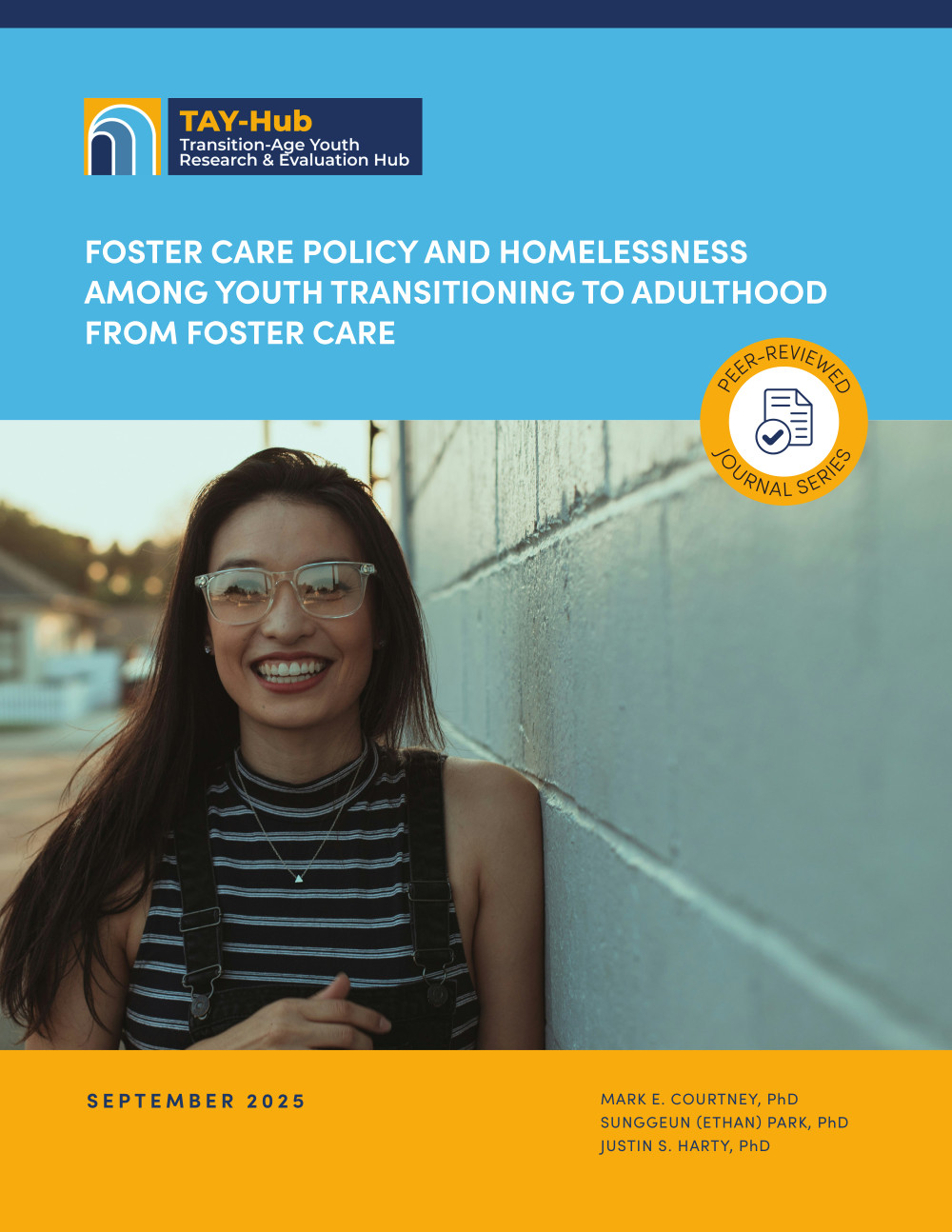
Authors: Keunhye Park, Nathanael J. Okpych, Mark E. Courtney Extensive research has linked having a strong social support network to positive outcomes during young adulthood, particularly for young people with foster care experience. Although there has been growing concern about the wellbeing of youth living in congregate care settings (such as group home care or […]

Authors: Anthony Gómez; Kristina K. Lovato; Andrea Lane Eastman; Mark E. Courtney Despite the growing population of undocumented young adults living in the United States, little is known about the prevalence and experiences of undocumented transition-age youth (TAY) in foster care. This study evaluated the research utility of immigration status documentation in California’s administrative child […]

Authors: Anthony Gómez; Mark E. Courtney Entering the workforce and securing a livable wage are essential milestones for emerging adults. Nevertheless, young people exiting foster care (also referred to as transition-age youth or TAY) report higher unemployment rates and suppressed wages in comparison to peers who did not live in foster care. Gender and racial […]

Authors: Sunggeun (Ethan) Park; Melanie Nadon; Nathanael J. Okpych; Justin S. Harty; Mark Courtney Transition-age youth with foster care involvement (TAY) face significant risks for food insecurity and other hardships in early adulthood. Despite the prevalence of food insecurity in the U.S., negative outcomes associated with food insecurity among young adults, and the compounding vulnerabilities […]

Authors: Anthony Gómez; Andrea Lane Eastman; Mark E. Courtney Although California’s county-administered child welfare system allows agencies to tailor services to local needs, it also presents challenges when young people in foster care move between counties. This is particularly relevant for transition-age youth (TAY) exiting foster care, who often relocate to be closer to their […]

Authors: Sunggeun (Ethan) Park; Nathanael J. Okpych; Mark E. Courtney California’s county child welfare departments increasingly rely on nonprofit organizations to administer specialized extended foster care services to TAY. In 2020, over 2,000 TAYs in California were being served by a Transitional Housing Placement (THP) administered by one of more than 60 licensed nonprofit providers. […]

Authors: Ivy Hammond; Keunhye Park; Andrea Lane Eastman; Mark E. Courtney This study is the first examination of factors associated with residential mobility in a statewide population of young adults residing in extended foster care in California. Using administrative data for 10,517 young adults who turned 18 between 2016 and 2019, the study examines factors […]
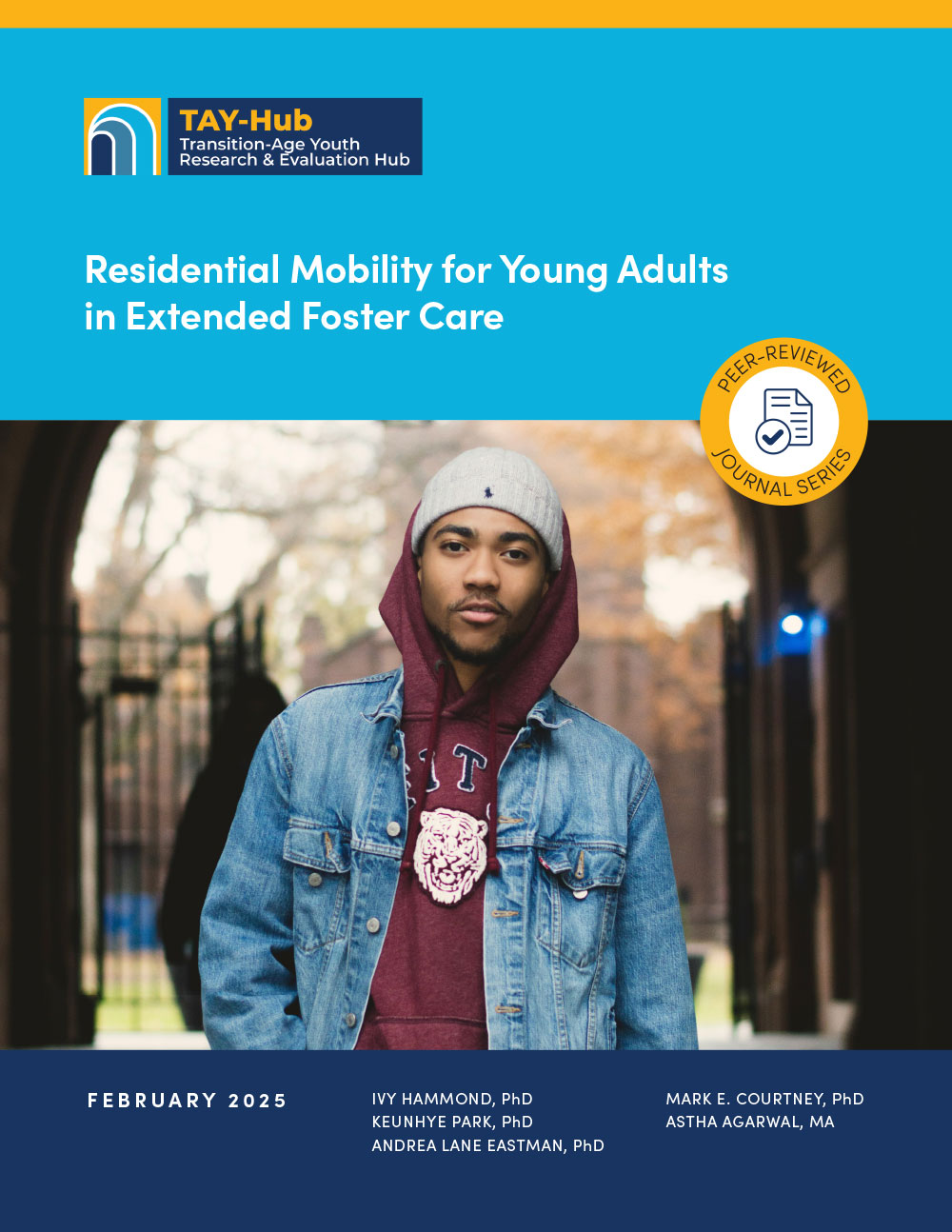
Authors: Colleen C. Katz; Nathanael Okpych; Eden Wall; Jama Shelton; Mark E. Courtney This brief summarizes findings from a study examining the relationships between demographic, experiential, and behavioral health characteristics associated with suicidal ideation and attempts among transition-age youth with child welfare experience (TAY). Using longitudinal data from the CalYOUTH study, researchers found that by […]

Authors: Keunhye Park; Michelle R. Munson; Mark E. Courtney; Kierra (Blair) Crisswell Research shows that young people in foster care experience high levels of behavioral health problems that may lead to life obstacles, including legal system involvement (LSI) during the transition to adulthood. However, few longitudinal studies have examined LSI among foster youth from a […]

Authors: Mark E. Courtney; Andrea Lane Eastman; Anthony Gómez; Ivy Hammond; Judi Babbitt; Sunggeun (Ethan) Park In California, the state government sets policies and provides funding, while each of the 58 counties administers child welfare services. County-level factors can affect the availability of services and outcomes of transition-age youth. Still, little research has examined how […]

Authors: Sunggeun (Ethan) Park; Nathanael J. Okpych; Justin S. Harty; Mark E. Courtney Extended foster care (EFC) is an important policy that supports human capital attainment for foster youth transitioning to adult independence. Previous studies have examined youth- and policy-level factors’ influence on EFC participation and human capital outcomes (e.g., education, employment). Still, few studies […]

Authors: Colleen C. Katz; Nathanael J. Okpych; Pajarita Charles; Eden Wall; Mark E. Courtney Understanding the factors that place TAY at risk of intimate partner violence (IPV) is central to prevention and treatment of this public health problem. However, questions remain about the prevalence and correlates of IPV among youth in foster care and emotional […]

Authors: Nathanael J. Okpych; Sunggeun (Ethan) Park; Jenna Powers; Justin S. Harty; Mark E. Courtney Long-lasting, supportive relationships (what we call “enduring relationships”) are important for youths’ transition to adulthood, but these relationships are often ruptured for young people in foster care. We investigate how common enduring relationships are among youth making the transition out […]

Authors: Keunhye Park; Mark E. Courtney Drawing from social control theory and using CalYOUTH survey data, the study explores two domains of social bonds (interpersonal bonds, institutional bonds) youth had at the onset of adulthood, and assess the association between domains of social bonds and later incarceration in early adulthood. While results provide no support […]

Authors: Sunggeun (Ethan) Park; Jenna Powers; Nathanael J. Okpych; Mark E. Courtney The co-production of transition planning (i.e. care leavers having opportunities to influence decisions about their lives) is recognized as an important process internationally. However, little is known about factors influencing care leavers’ involvement in transition planning. This study uses a sample of care […]
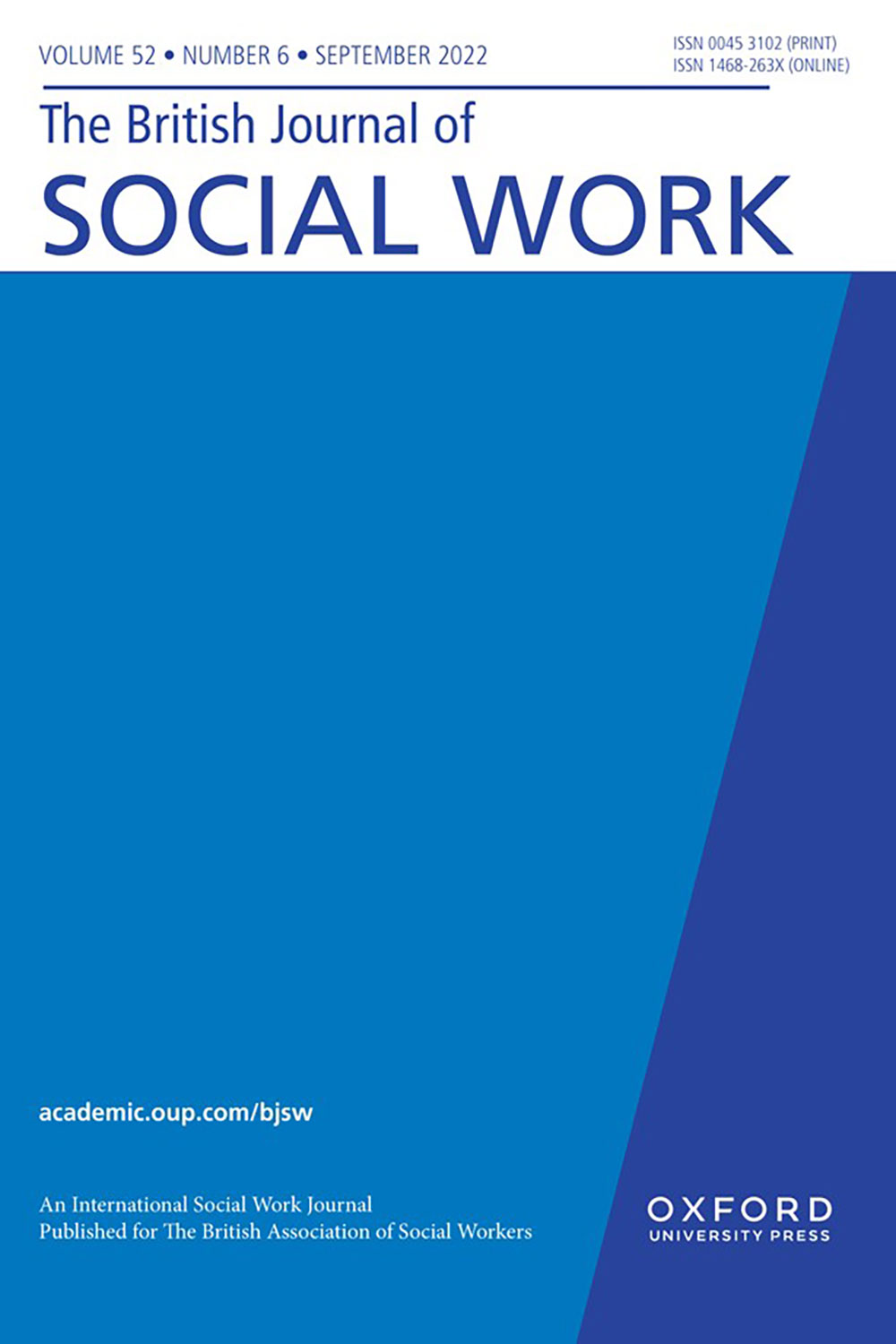
Authors: Nathanael J. Okpych The launch of the National Youth in Transition Database (NYTD) in 2011 was a watershed moment in the history of studyingolder youth in foster care. For the first time, there was the prospect of generating national estimates of key policy-relevant outcomes, such as the rate youth enroll in postsecondary education (PSE). […]
Authors: Melanie L. Nadon; Sunggeun (Ethan) Park; Huiling Feng; Mark E. Courtney Youth exiting foster care experience high rates of poverty, homelessness, and food insecurity. However, little evidence documents their experiences of economic hardships, precursors to or early symptoms of the poor outcomes. We investigate the prevalence of foster youth’s economic difficulties and the factors […]

Authors: Keunhye Park Foster youth are at increased risk of entering the justice system, particularly as they age out of foster care. The high prevalence of crime among foster youth has concerned practitioners, researchers, and policymakers. Given the public attention to address the disproportionate rates of juvenile justice system involvement among young people in foster […]

Authors: Mark E. Courtney; Andrea Lane Eastman; Lisa Schelbe; Justin S. Harty Although the rate of early parenting has continued to decline steadily through 2019, a large proportion of young people making the transition from foster care to adulthood become parents during adolescence and early adulthood. The Fostering Connections to Success and Increasing Adoptions Act […]

Authors: Keunhye Park; Mark E. Courtney; Anthony Gómez Psychotropic medication use among transition-age youth (TAY) in foster care is a topic of substantial debate. While psychotropic medications can help TAY manage psychiatric symptoms, others share concerns that youth are administered these medications without sufficiently addressing the underlying causes of emotional and behavioral distress. Furthermore, youth […]
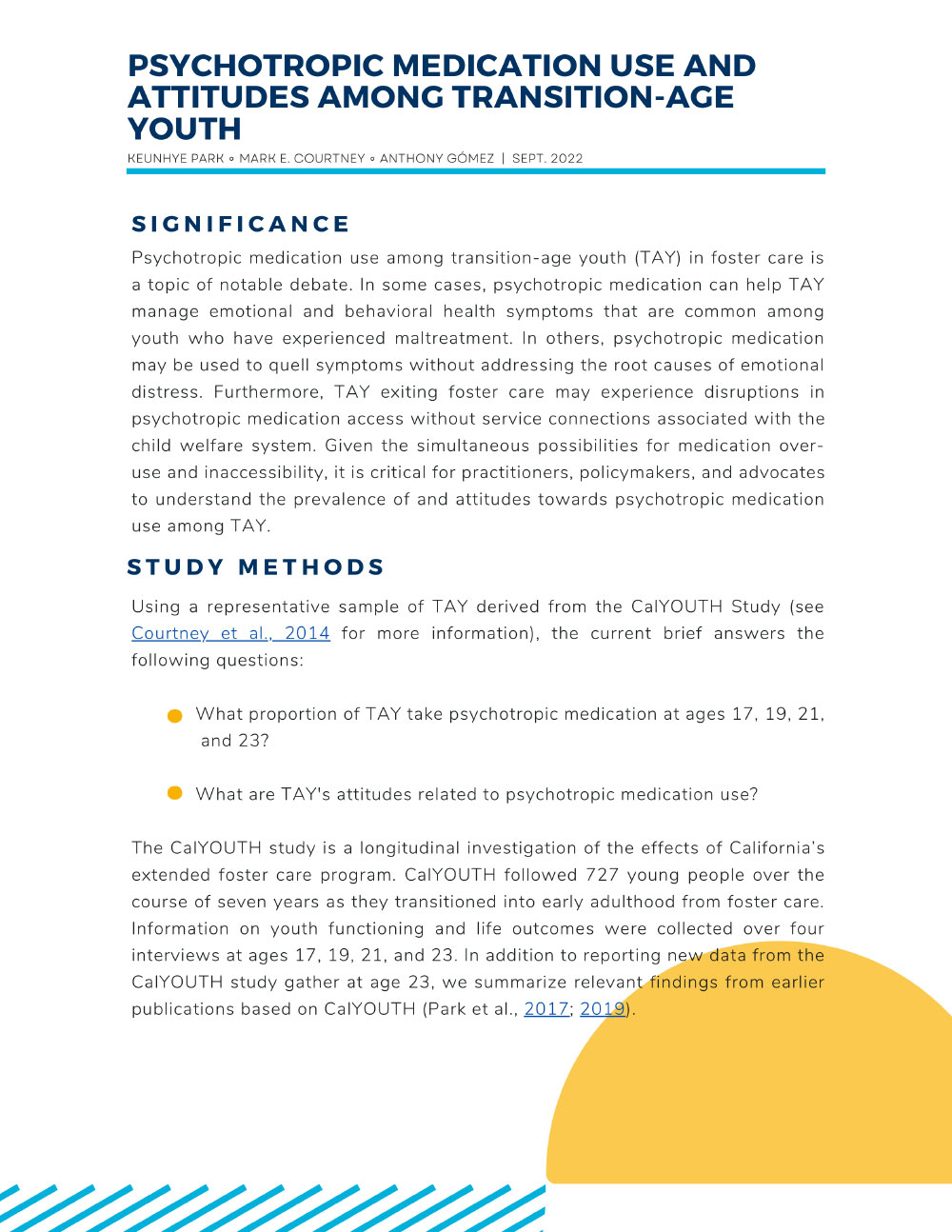
Authors: Anthony Gómez; Mark E. Courtney Despite scholarly and programmatic investment in kinship care, little is known about the experience of transition-age youth (TAY) in foster care who live with relatives, be they kinship caregivers, birth or stepparents, siblings, partners, or non-relative extended family members. Understanding TAY’s relations with relatives as they transition out of […]

Authors: Nathanael J. Okpych; Sunggeun (Ethan) Park; Mark E. Courtney; Jenna Powers Earning a college degree can help former foster youth increase their likelihood of getting a job and earning more as adults. However, less than a tenth of these young people complete college by early adulthood. This study explored factors that might be related […]

Authors: Mark E. Courtney, Nathanael J. Okpych, Sunggeun (Ethan) Park Building on prior research showing that at age 21, extended foster care had links to improved educational success and employment, financial security, social support, and other benefits, this research followed up with a sample of foster youth aged 23 or older regarding outcomes of extended […]
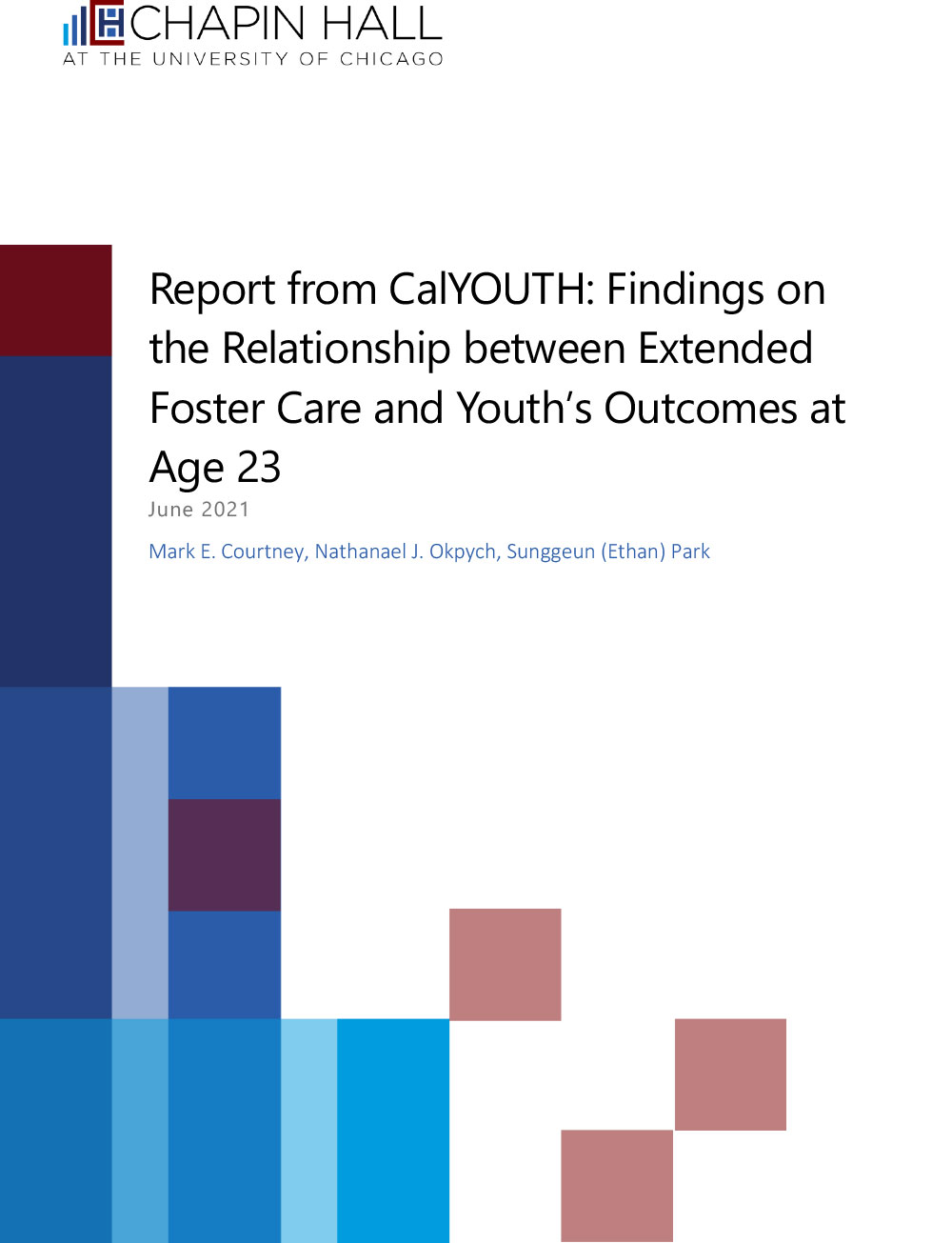
Authors: Sunggeun (Ethan) Park; Nathanael J. Okpych; Mark E. Courtney The Fostering Connections to Success and Increasing Adoptions Act of 2008 created the option for U.S. states to extend the foster care age limit up to the 21 st birthday. The law provides foster youth extra protections while they transition to adulthood. To inform states’ […]
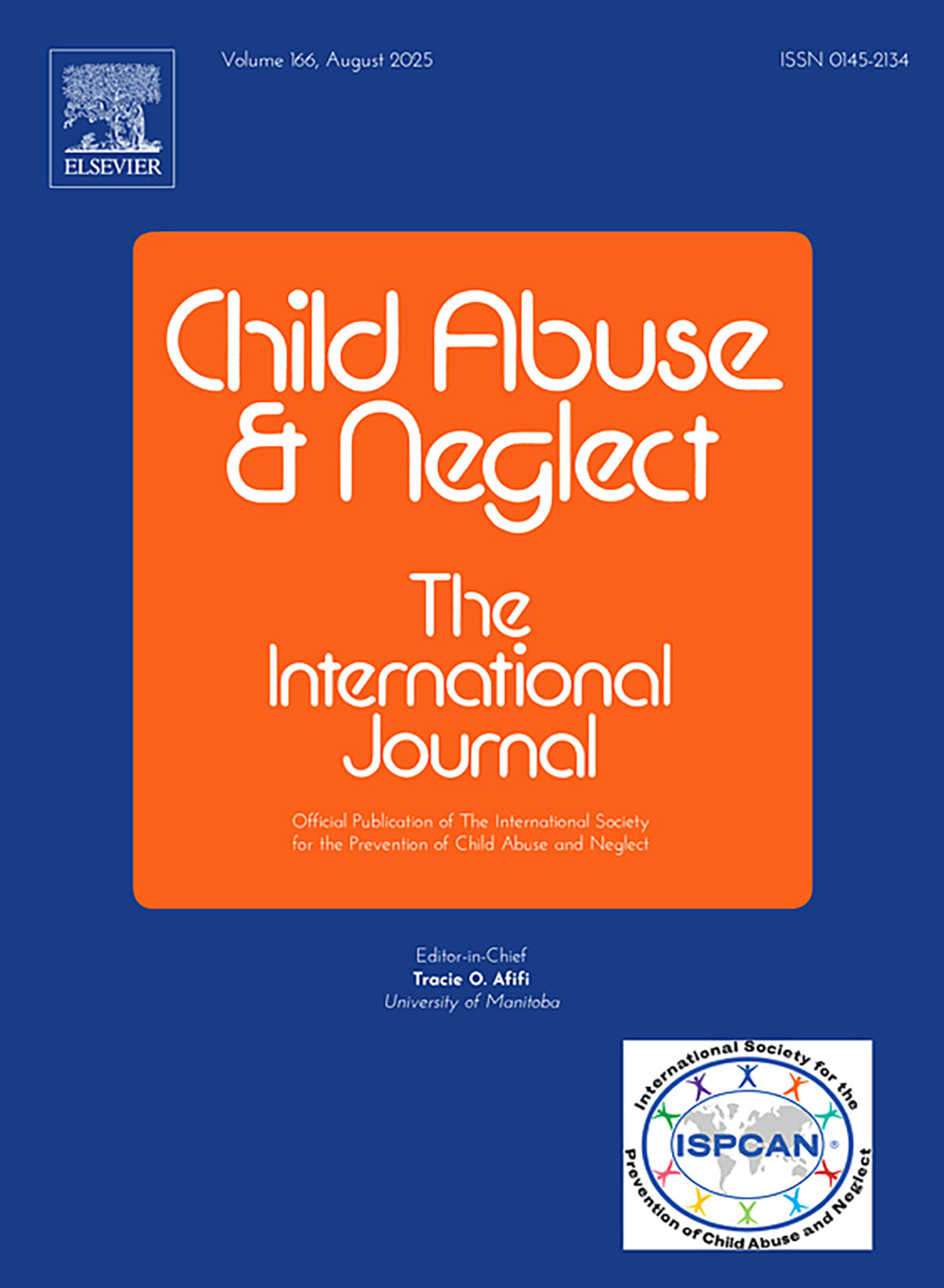
Authors: Mark E. Courtney; Nathanael J. Okpych; Justin S. Harty; Huiling Feng; Sunggeun (Ethan) Park; Jenna Powers; Melanie Nadon; Dale J. Ditto; Keunhye Park CalYOUTH researchers have been following foster youth in California since age 16 or 17, and this memo reports on findings from the fourth wave of the study, when participants were around […]

Authors: Nathanael J. Okpych; Mark E. Courtney; Sunggeun (Ethan) Park Previous CalYOUTH memos suggest that the overwhelming majority (upwards of 85%) of youth in California foster care who go to college first attend an in-state, public, 2-year college. The current memo takes a closer look at the types of colleges that foster youth enroll in, […]
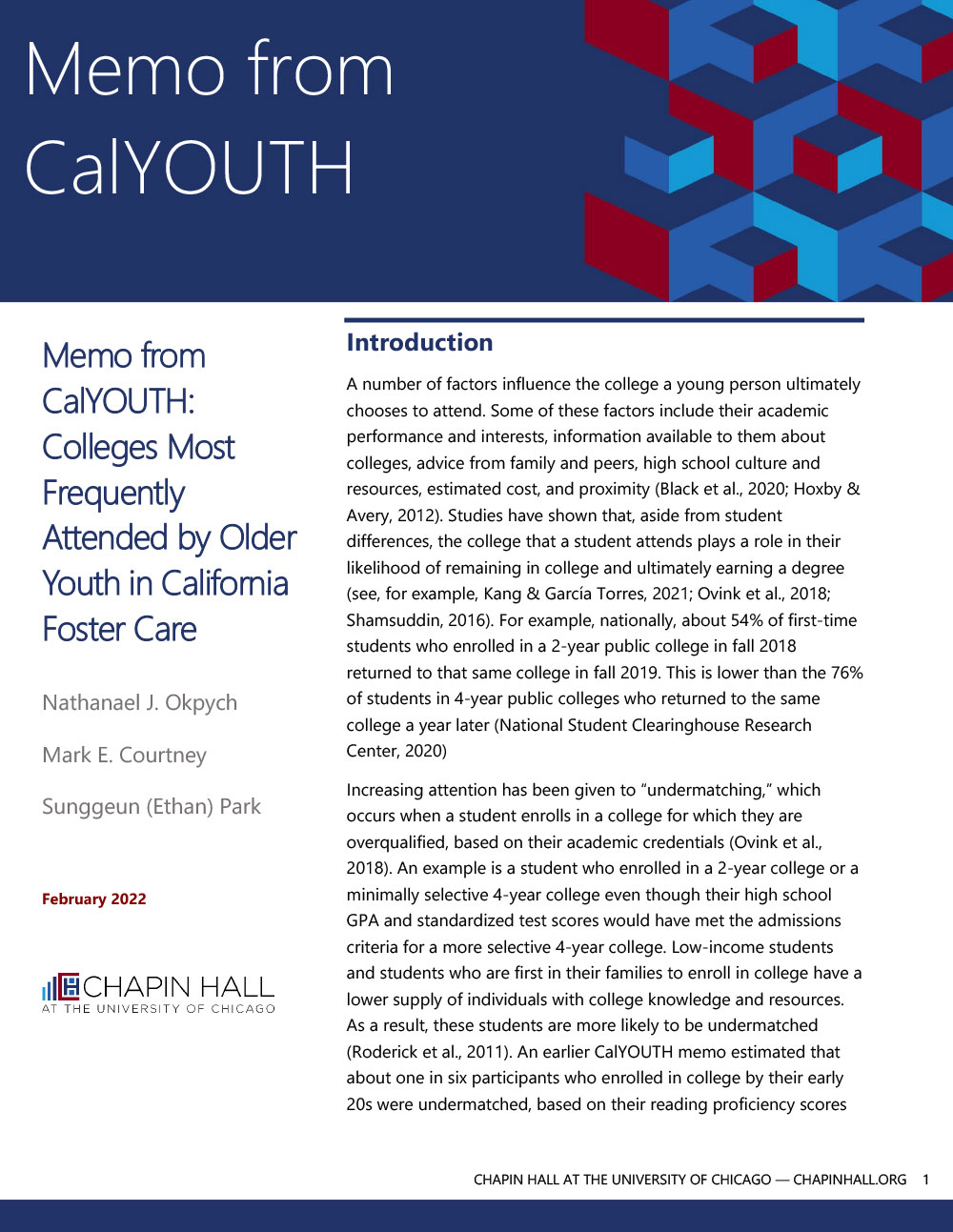
Authors: Jenna Powers; Sunggeun (Ethan) Park; Nathanael J. Okpych; Mark E. Courtney Youth participation is the involvement of youth in the decisions related to their lives. For youth in foster care, this process is formalized through case planning that occurs between the youth, a child welfare worker, and other key players involved with the case. […]

Authors: Huiling Feng; Justin S. Harty; Nathanael J. Okpych; Mark E. Courtney A major argument for extended foster care is that allowing foster youth to remain in care after age 18 will improve outcomes in adulthood. This research explored a critical marker of well-being for youth in extended care: homelessness. It also considered risk and […]

Authors: Keunhye Park; Mark E. Courtney; Nathanael J. Okpych; Melanie Nadon As foster youth approach the transition to adulthood, they are more likely than their peers to become involved in the justice system and engage in delinquent behaviors. This memo explored arrest, incarceration, and conviction among foster youth transitioning to adulthood in California, including type […]

Authors: Huiling Feng; Mark E. Courtney; Nathanael J. Okpych Providing housing that is appropriate for foster youth based on their individual needs and helps them achieve independence is critical. But few studies have explored how placement decisions are made, what predicts the type of placement, and how this affects foster care outcomes. This study explored […]
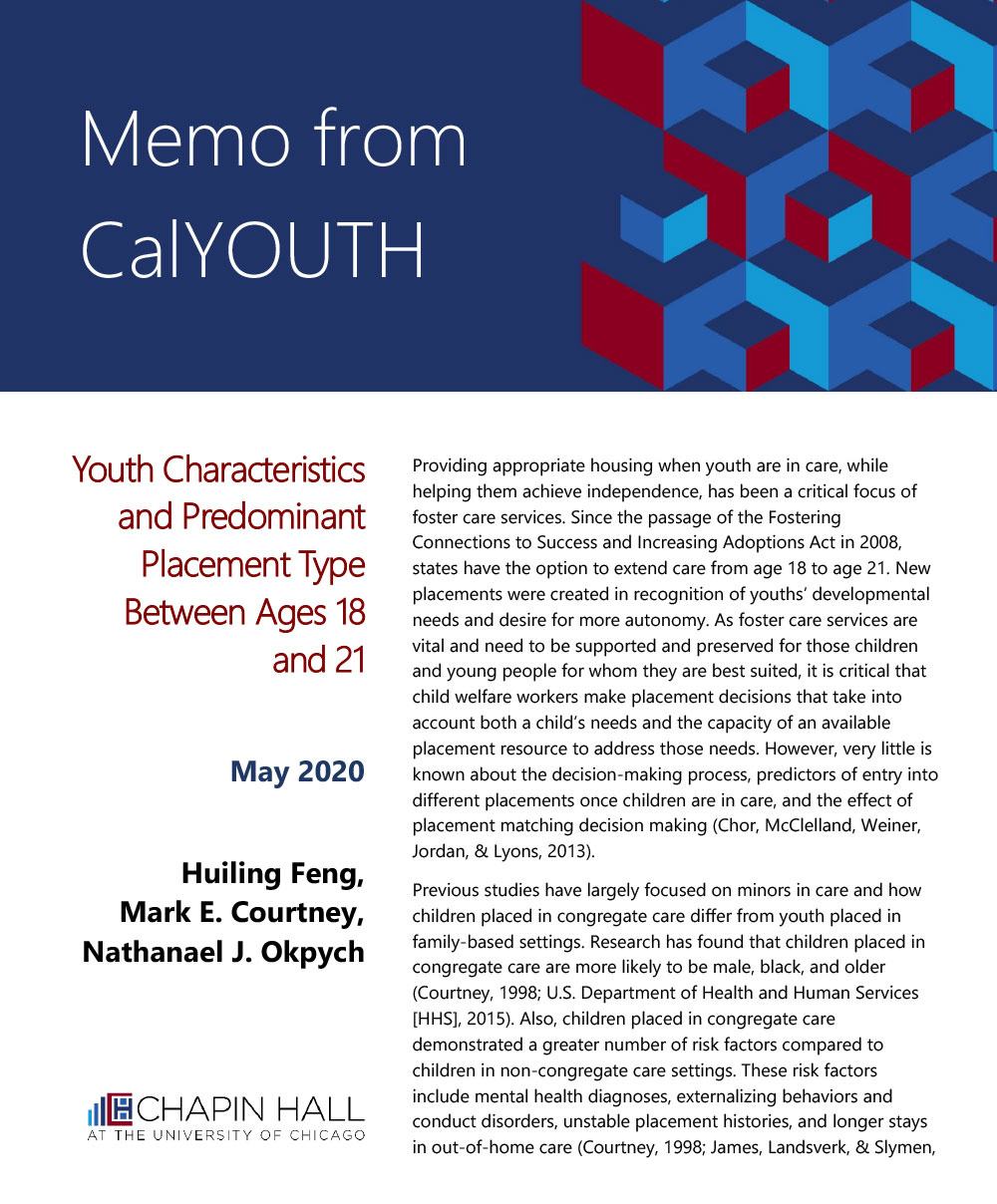
Authors: Michelle R. Munson; Colleen C. Katz; Nathanael J. Okpych; Mark E. Courtney The aim of the study was to document mental health service use (counseling and medication) among youth in foster care, examine how prepared they feel to manage their mental health, and investigate predictors of service use and preparedness. The study includes a […]

Authors: Sunggeun (Ethan) Park; Jenna Powers; Nathanael J. Okpych; Mark E. Courtney Foster youth participation in their transitional independent living plan (TILP) development is a legally mandated process. Youths’ active involvement in these decision-making processes is recognized as a potential protective factor during their transition from care to independent adulthood. Despite this, little empirical research […]

Authors: Nathanael J. Okpych; Sunggeun (Ethan) Park; Samiya Sayed; Mark E. Courtney Education and Training Vouchers (ETVs) and campus support programs (CSPs) are two interventions designed to support postsecondary education persistence for college students with foster care backgrounds. The federal ETV program provides foster youth up to $5000 per year for college expenses, while CSPs […]

Authors: Nathanael J. Okpych, Mark E. Courtney, Sunggeun (Ethan) Park Studies have shown that, aside from student differences, the college that a student attends plays a role in their likelihood of remaining in college and ultimately earning a degree. Increasing attention has been given to “undermatching,” which occurs when a student enrolls in a college […]

Authors: Nathanael J. Okpych; Mark E. Courtney This paper draws on data collected from two of the most extensive longitudinal studies of care leavers in the US. The Midwest Study (2003–2011) included 732 youths in foster care in three Midwestern states, and the CalYOUTH Study (2012–present) includes 727 youths in California foster care. The paper […]

Authors: Mark E. Courtney; Sunggeun (Ethan) Park; Nathanael J. Okpych; Samiya Sayed Research has revealed benefits of extended foster care in areas including education, housing, pregnancy and parenting, social support, employment, and criminal justice involvement. In California’s child welfare system, services are overseen at the county level, potentially affecting whether and how long youth participate […]
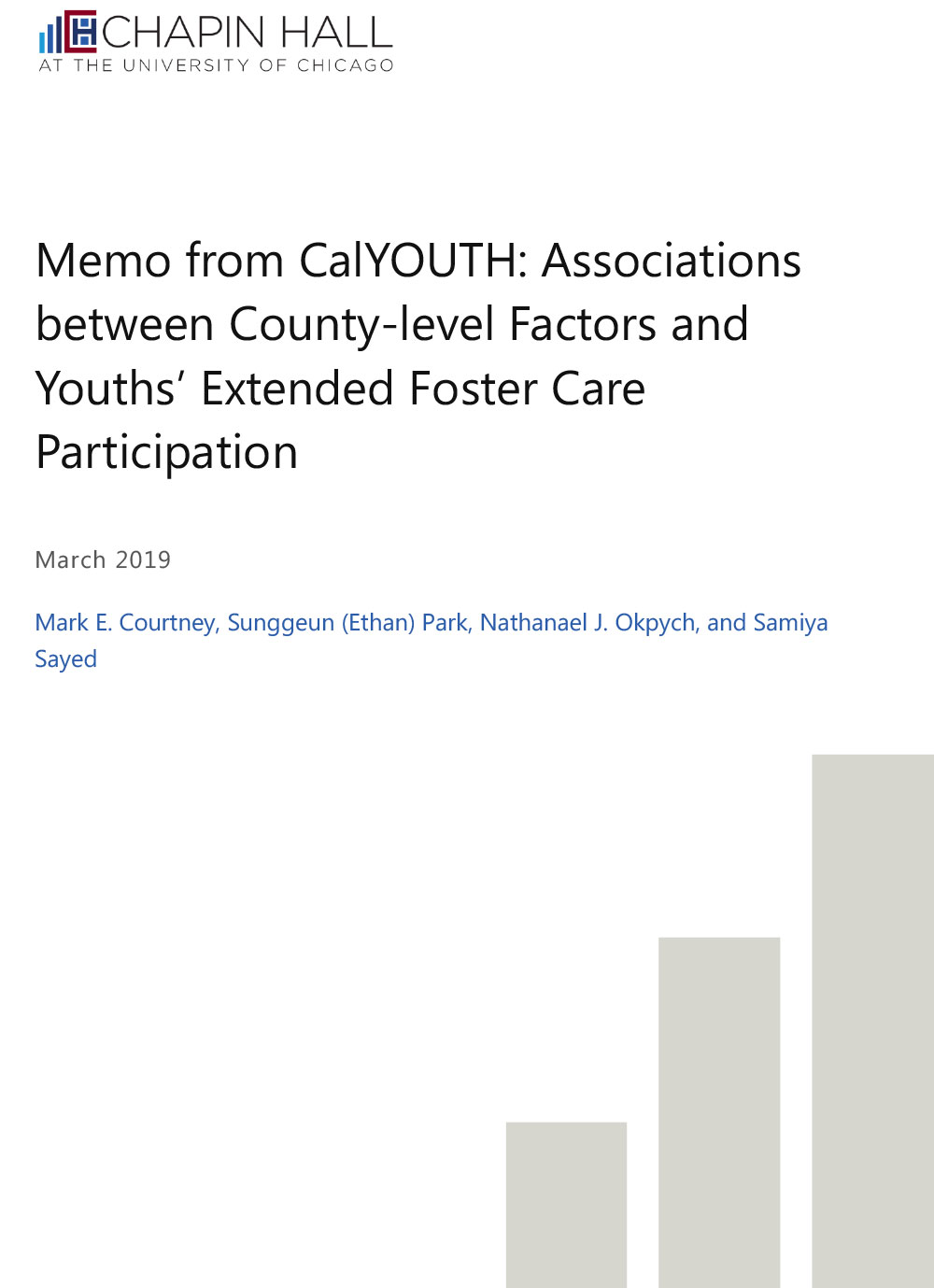
Authors: Nathanael J. Okpych; Sunggeun (Ethan) Park; Mark E. Courtney Few studies have considered whether extending foster care beyond age 18 affects achievement in higher education. This study relied on a large sample of foster youth in California child welfare records, including those in care before and after the state passed legislation permitting extended care. […]
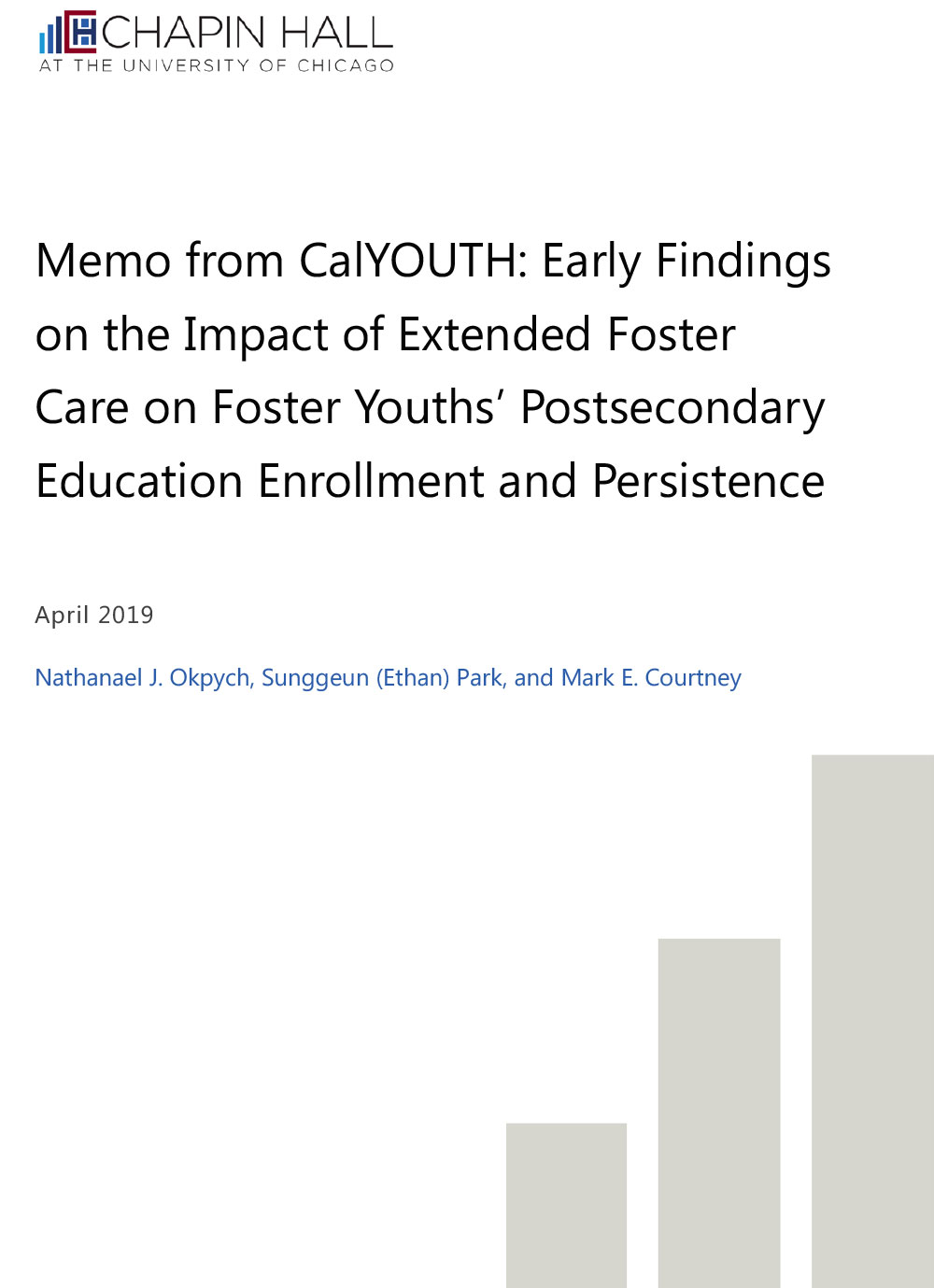
Authors: Mark E. Courtney; Sunggeun (Ethan) Park; Justin S. Harty; Huiling Feng A key to improving extended foster care is understanding the associations between services provided in care, youth’s satisfaction with those services, and their outcomes. This study relied on survey data from youth and child welfare workers, paired with administrative data, to understand these […]

Authors: Adrianna Torres-Garcia; Nathanael J. Okpych; Mark E. Courtney Although many foster youths are ambitious about pursuing higher education, prior studies have shown they often enter college unprepared. Their perceptions of their abilities can affect how they handle struggles in college and whether they seek help. Likewise, the perceptions of their child welfare caseworkers can […]

Authors: Mark E. Courtney; Nathanael J. Okych Research over the past two decades has generally shown poor postsecondary educational outcomes for youth transitioning to adulthood from out-of-home care, but research on the topic is limited. The California Youth Transitions to Adulthood Study (CalYOUTH) has been following the educational trajectories of a population-based sample of youth […]

Authors: Keunhye Park; Nathanael J. Okpych; Mark E. Courtney The prevalence of psychotropic medication use among children and adolescents in foster care has received increasing attention from policymakers and scholars and led to responses from government. Most research has focused on school-age foster children; less is known about psychotropic medication use among foster youth transitioning […]

Authors: Mark E. Courtney This chapter summarizes recent research in the United States providing evidence of the benefits of allowing youth in foster care to remain in care through their 21st birthdays. The chapter provides relevant background information about the foster care system in the United States, describes two studies that have considered the relationship […]

Authors: Mark E. Courtney; Nathanael J. Okpych; Keunhye Park; Justin S. Harty; Huiling Feng; Adrianna Torres-Garcia; Samiya Sayed The CalYOUTH Wave 3 Youth Survey provides the most comprehensive view to date of young adults making the transition to adulthood from foster care in California, the state with the largest foster care population in the nation, […]

Authors: Andrew Zinn; Mark E. Courtney With many states having now extended foster care to age 21, some people have expressed concerns about this extended care causing a decrease in legal permanency outcomes like adoption, family reunification, and guardianship. This study explored changes in permanency rates before and after California implemented extended foster care, including […]
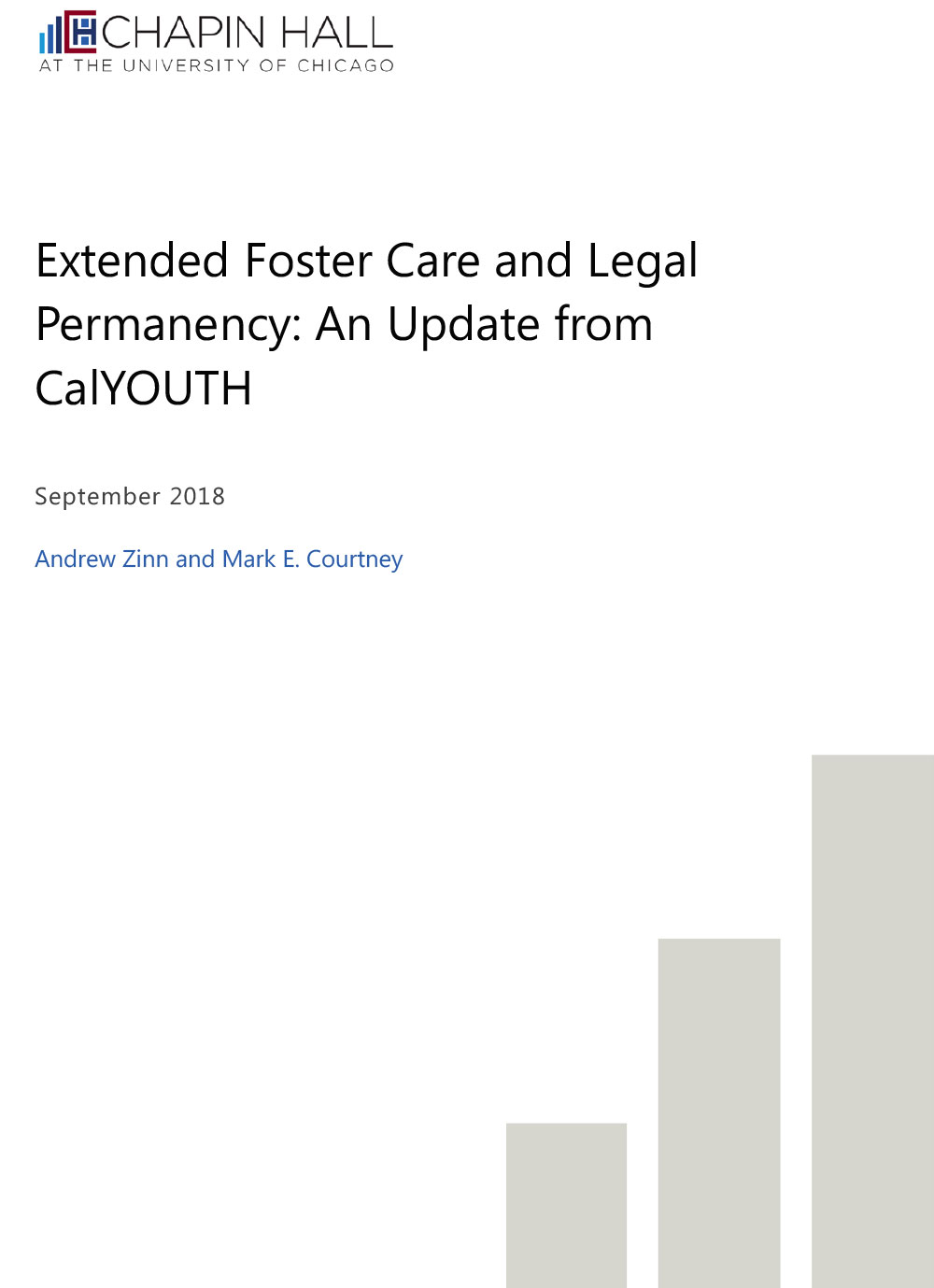
Authors: Nathanael J. Okpych; Keunhye Park; Huiling Feng; Adrianna Torres-García; Mark E. Courtney Social support is a critical component of promoting resilience and self-esteem among foster youth as they near adulthood. Because they often lack a safety net in the form of parents who can offer emotional and material support, these youth regularly turn to […]

Authors: Nathanael J. Okpych; Huiling Feng; Keunhye Park; Adrianna Torres-García; Mark E. Courtney Social support is important for promoting resiliency and decreasing the occurrence and impact of negative life events as foster youth transition to adulthood. However, the types and amount of support may vary by where youth are placed. Additionally, it is not known […]

Authors: Mark E. Courtney; Nathanael J. Okpych; Sunggeun (Ethan) Park The federal Fostering Connections to Success and Increasing Adoptions Act of 2008 (Fostering Connections Act) was, to a large extent, based on the belief that allowing youth in foster care to remain in care past their 18th birthday would improve their outcomes as adults. Research […]

Authors: Nathanael J. Okpych; Mark E. Courtney This study evaluates foster care history characteristics as risk factors for psychopathology. We examine characteristics of youths’ foster care histories separately and as a gestalt (i.e., identification of latent classes). Six mental health disorders and lifetime suicide attempt were assessed via in-person interviews with a representative sample of […]

Authors: Mark E. Courtney; Nathanael J. Okpych Foster youth are less likely to enroll in college or continue their studies beyond their first year than their peers. However, evidence shows that receiving foster care services after age 18 could provide resources like subsidized housing and access to child welfare support that could improve their college […]

Authors: Mark E. Courtney; Nathanael J. Okpych Studies have shown that foster youth tend to struggle more than their peers as they enter adulthood, including in education, employment, homelessness, mental health, and criminal justice. Recent evidence suggests that allowing foster youth to remain in care after age 18 can lead to beneficial outcomes. This study […]

Authors: Mark E. Courtney; Justin S. Harty; Brittani Kindle; Kristin Dennis; Nathanael J. Okpych; Adrianna Torres-García Because California has the largest foster care population in the country by state, its extension of foster care through age 21 has national implications. This study explores outcomes among foster care youth at age 19 in Los Angeles County, […]

Authors: Nathanael J. Okpych; Mark E. Courtney; Kristin Dennis Securing a job and earning a living wage is increasingly linked to finishing high school and earning a college degree. Foster youth are less likely than their peers to achieve these academic milestones. This study explored factors associated with youths’ educational outcomes, including demographic characteristics, academic […]

Authors: Keunhye Park; Nathanael J. Okpych; Mark E. Courtney Concerns about the high use of psychotropic medications among young people in foster care prompted national leaders to mandate that child welfare agencies begin monitoring the use of these medications among children in state care. This study examined psychotropic medication use among transition-age foster youth in […]

Authors: Nathanael J. Okpych; Mark E. Courtney This study investigated social capital, risk factors, and protective factors associated with the likelihood that youth in foster care will enroll in college. We tested three hypotheses: (a) having a greater number of institutional agents promotes college enrollment, (b) encouragement from school personnel to pursue postsecondary education promotes […]
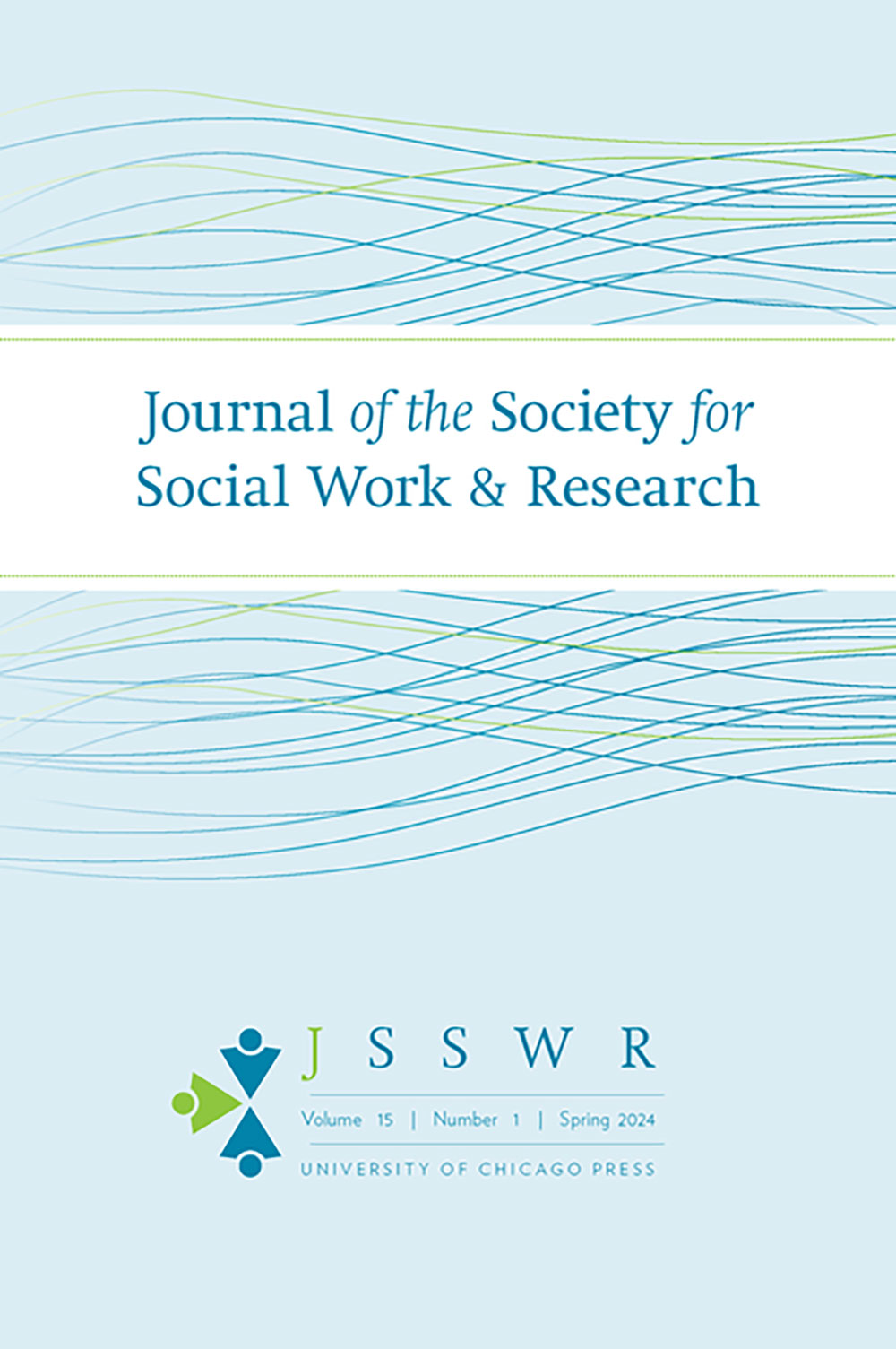
Authors: Mark E. Courtney; Nathanael J. Okpych; Dominique Mikell; Brooke Stevenson; Keunhye Park; Justin S. Harty; Huiling Feng; Brittani Kindle With the passage of federal legislation in 2008 that provided funding to extend foster care beyond age 18, states are grappling with how best to provide services to transition-age youth who are nearing independence. This […]

Authors: Mark E. Courtney; Nathanael J. Okpych; Pajarita Charles; Dominique Mikell; Brooke Stevenson; Keunhye Park; Brittani Kindle; Justin S. Harty Huiling Feng To understand the effects of extending foster care eligibility for youth in California to age 21, researchers have surveyed foster youth throughout the state episodically since age 16 or 17. This memo reports […]

Authors: Mark E. Courtney; Pajarita Charles; Nathanael J. Okpych; Katherine Halsted; To understand how California’s extension of foster care through age 21 might benefit youth in care, the CalYOUTH Study team surveyed 235 child welfare workers throughout the state. Findings presented in this report outline how these workers perceive extended foster care, including the availability […]

Authors: Laura Napolitano; Yafit Sulimani-Aidan; Mark E. Courtney Given the relatively recent expansion of foster care eligibility to age 21, more information is needed about how foster youth and child welfare workers view and understand extended foster care. This study explored the perspectives of youth in care and their caseworkers across California, including motivation to […]

Authors: Mark E. Courtney; Nathanael Okpych As states have begun enacting legislation permitting foster youth to remain in care until age 21, concerns have emerged about whether this extended care could reduce their likelihood of reunification, adoption, or guardianship. Does extended care decrease the sense of urgency among child welfare providers and court personnel to […]

Authors: Mark E. Courtney; Pajarita Charles As foster youth leave the care system and enter adulthood, they are much more likely than their peers to have mental health disorders and often use illicit substances. This study explored mental health and substance use disorders in a sample of foster youth in California, along with use of […]

Authors: Nathanael J. Okpych; Mark E. Courtney; Parjarita Charles Older adolescents in foster care often struggle in school due to life disruptions, setbacks, or issues like being suspended or repeating a grade. Nonetheless, they remain academically ambitious and aspire to complete a college degree. This memo explores academic status and services among older adolescents in […]

Authors: Laura Napolitano; Mark E. Courtney In 2012, youth in foster care in California gained the right to remain in care after age 18 through legislative efforts to extend foster care through age 21. However, this expansion of care includes new requirements for these older youth, including limitations on where they live. This study represents […]

Authors: Mark E. Courtney; Amy Dworsky; Laura Napolitano Until recent decades, youth in foster care who “aged out” of the system when they turned 18 faced challenges ranging from homelessness and poverty to criminal justice involvement. To ease their transition to independent living, legislators approved extended foster care, allowing them to remain in care until […]

Authors: Jennifer E. Mosley; Mark E. Courtney California’s Fostering Connections to Success Act (commonly known as AB12) was signed into law by Governor Arnold Schwarzenegger on September 30, 2010. As a result of this legislation, as of January 1, 2012, foster youth in California who turn 18 had the right to stay in care until […]


